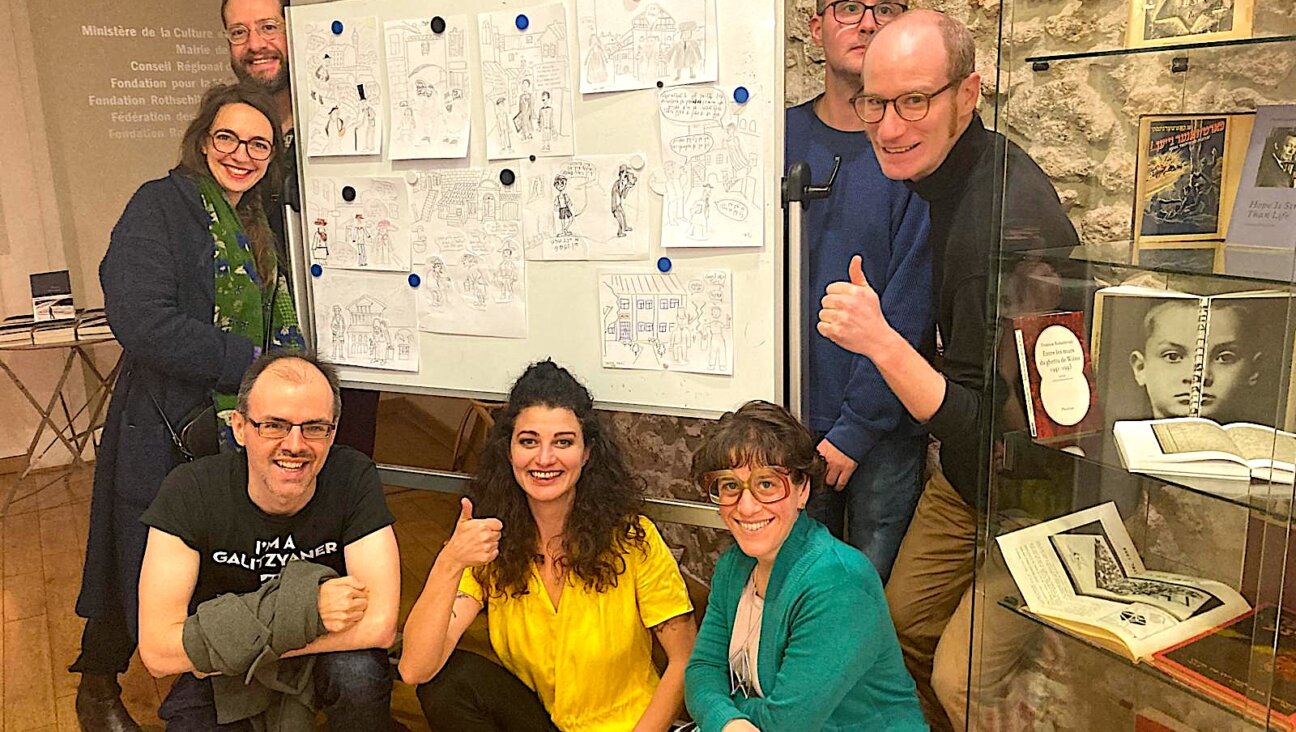A Holly Jolly Hybrid Holiday
Chrismukkah: Everything You Need To Know To Celebrate the Hybrid Holiday
By Ron Gompertz
Stewart, Tabori & Chang, 144 pages, $17.95
Ron Gompertz has found the solution to the December Dilemma: He punts.
Gompertz is the self-appointed pied piper of Chrismukkah, a hybrid holiday popularized three years ago by the Fox television series “The O.C.” A New York Jew transplanted to Montana (of all places) and married to the daughter of a United Church of Christ pastor, Gompertz jumped on the Chrismukkah bandwagon (to the apparent chagrin of the creator of “The O.C.”), launching the Web site Chrismukkah.com, where he sells greeting cards and various holiday-related tchotchkes.
Now he’s written a book, “Chrismukkah: Everything You Need To Know To Celebrate the Hybrid Holiday.” In 144 colorful pages, Gompertz serves up a syncretistic smorgasbord of do-it-yourself recipes (“Fa La La Latkes”), drinks (“Yule Plotz Egg Nog”) and decorations (What’s a Chrismukkah tree without “menorahments”?). Gompertz, whose sense of humor is decidedly more ham than wry, also tosses in hybridized holiday song lyrics, a list of Hollywood “half-Hebrews” and some silly stories, including one in which Mrs. Claus divorces her cheating, sleigh-riding husband and is swept off her feet by “Hanukkah Harry.”
“Chrismukkah is a celebration of diversity, a global gumbo of cherished secular traditions,” Gompertz writes. “It’s the good stuff we all enjoy, no matter what our religion: sleigh bells, eggnog, snowmen, twinkling lights, flickering candles, exchanging gifts with family and friends.”
To those who may think that Chrismukkah is nothing more than newfangled nonsense, Gompertz has a ready retort: Tradition! As it turns out, the holiday has a long history in Gompertz’s family. His mother was born in Germany, her father a Lutheran and her mother Jewish. Before Hitler’s rise to power, the family, like many other assimilated German Jews, celebrated both December holidays, a combination that was dubbed “Weihnukkah,” from Weihnachten, the German word for Christmas — in other words, Chrismukkah.
Indeed, as Gompertz notes, the winter holidays have histories of hybridity. Many traditions associated with Christmas — including the fact that it’s even celebrated in the winter — have pagan roots. Santa Claus is himself a mélange of some dozen different folkloric figures. And let’s be honest, what is Hanukkah, as celebrated today, with its eight nights of gifts, if not an effort to one-up (or seven-up, as the case may be) Christmas?
Chrismukkah is certainly fun for the kids. (Really, what kid wouldn’t like a pine tree decked with bagels?) But is it good for the Jews? And is it good for Christmas? Some clearly don’t think so. In 2004, the Catholic League for Religious and Civil Rights and the New York Board of Rabbis issued a joint statement blasting the made-up holiday for “spiritual misrepresentation.”
True, Jesus plays little more than a bit part in “Chrismukkah,” and the Maccabees aren’t much in evidence, either. But Gompertz has no hidden agenda. “As a brand-new, twenty-first-century pseudoholiday, Chrismukkah is more connected to postmodern pop-culture traditions than the ancient ones,” he writes. Those up in arms over Chrismukkah are railing at the symptom of a much larger problem: Christmas and Hanukkah are so commercialized that they already have been stripped of much of their deeper religious meaning.
Personally, having grown up in a family in which not having a Christmas tree was as central to our Jewishness as lighting the menorah, I was prepared to hate “Chrismukkah.” But it’s hard to hate a book that features pictures of dogs wearing yarmulkes, snowmen made out of matzo balls and delightfully schmaltzy jokes on almost every page — even for a grinch like me. I may not like the hybrid holiday, but I have to give credit where it’s due: Ron Gompertz has written a very merry Chrismukkah book. Ho, ho, ho — and oy, oy, oy.
Daniel Treiman is the founding editor of The Brooklynite magazine and a former associate editor at the Forward.
A message from our CEO & publisher Rachel Fishman Feddersen

I hope you appreciated this article. Before you go, I’d like to ask you to please support the Forward’s award-winning, nonprofit journalism during this critical time.
We’ve set a goal to raise $260,000 by December 31. That’s an ambitious goal, but one that will give us the resources we need to invest in the high quality news, opinion, analysis and cultural coverage that isn’t available anywhere else.
If you feel inspired to make an impact, now is the time to give something back. Join us as a member at your most generous level.
— Rachel Fishman Feddersen, Publisher and CEO






















